Carpenter Technology Corporation
Carpenter Technology Corporation develops, manufactures, and distributes stainless steels and corrosion-resistant alloys. In fiscal year 2018, the company's revenues were derived from the aerospace and defense industry (55%), the industrial and consumer industry (17%), the medical industry (8%), the transportation industry (7%), the energy industry (7%), and the distribution industry (6%).[1] The company's products are used in landing gear, shaft collars, safety wires, electricity generation products, intervertebral disc arthroplasty, and engine valves and weldings.
| Type | Public company |
|---|---|
| NYSE: CRS S&P 400 component | |
| Industry | Metal |
| Founded | 1889 in Reading, Pennsylvania |
| Founder | James Henry Carpenter |
| Headquarters | Philadelphia, United States |
Key people | Tony R. Thene, President & CEO |
Production output | 265.620 million pounds (FY 2018) |
| Revenue | |
| Total assets | |
| Total equity | |
Number of employees | 5,100 (June 30, 2019) |
| Website | www |
| Footnotes / references [1] | |
History
The company was founded by James Henry Carpenter and a small group of New York City investors in Reading, Pennsylvania in 1889 as the Carpenter Steel Company.[2]
In November 1896, the United States Secretary of the Navy referred to the company's armor-piercing projectiles as "the first made that would pierce improved armor plate." The routing of the Spanish fleet in the Battle of Manila Bay during the Spanish–American War of 1898 was credited in part to projectiles made by Carpenter.[2]
In 1903, Carpenter's "special" steels were used in the engine of the Wright brothers' maiden flight.[3]
In 1905, the company developed a prime grade chrome-nickel steel and by 1908 it had created 10 other steels that were used to make automobile chassis. "Old 16", the race car that won the Vanderbilt Cup in 1908, included front and rear axles, crankshaft, gears, and other parts fabricated from Carpenter steel.[4]
In 1917, the company manufactured its first high-strength, chemical-resistant stainless steel, which was immediately used in airplane engine components, cutlery, and spark plugs.[4]
Components of the engine of the "Spirit of St. Louis", Charles Lindbergh's plane that flew across the Atlantic Ocean in May 1927, were made from Carpenter steel. An identical engine had powered Richard E. Byrd's flight to the North Pole in 1926.[3]
In 1928, the company introduced the first free machining steel. It was 0.15% sulfur to make it easier to machine.[4][5]
In 1929, the Pierce-Arrow Motor Car Company used 24 pounds of stainless steel as trim on each of its cars.[5]
In 1934, during the Great Depression, the company introduced new stainless steels with additives of selenium, tellurium, and chrome and nickel.[5]
In June 1937, Carpenter Steel Company became a public company via an initial public offering.[3]
During World War II, the company's stainless steel was used in engine parts, steel fasteners, and cockpit instruments for fighter planes and bombers; components of Sherman tanks and submarines; radio masts for PT boats and radio equipment for battle fronts; and medical supplies such as hypodermic needles and surgical implements.[3]
In 1951, the company introduced "Stainless 20," a corrosion-resistant alloy.[6]
In 1957, after Northeastern Steel filed bankruptcy, it was acquired by Carpenter.[5]
In 1961, the company acquired NTH Products of El Cajon, California.[7]
In 1968, the company changed its name to Carpenter Technology Corporation to reflect its research and development initiatives.[1]
In 1969, the company acquired Gardner Cryogenics, but sued its former shareholders a year later after finding irregularities.[8] The company was sold a few years later.
In May 1983, the company acquired Eagle Precision Metals of Fryeburg, Maine, a precision drilling facility that produced high quality hollow steel bars.[9]
In 1984, the company acquired a wire-finishing plant, capable of redrawing steel wire to extremely fine sizes from AMAX Specialty Metals of Orangeburg, South Carolina. The plant was closed in 2012.[10]
In September 1986, 498 employees of the company participated in a strike action.[11] The strike ended in December 1986.[12]
In February 1992, the company received a patent for a super-strong Aermet alloy, first used for the landing gear on aircraft carrier-based jet fighters.[13]
In 1993, the company developed 14 alloys for knife blades.[14]
In January 1997, Carpenter acquired Dynamet, a titanium alloy producer based in Washington, Pennsylvania, for $161 million.[15]
In September 1997, the company acquired Talley Industries for $185 million.[16]
In July 1998, the company sold John J. McMullen Associates and Waterbury Companies.[17]
In October 1998, the company announced a $113.6 million investment to expand its Pennsylvania melt shop.[18]
In 2006, Carpenter Technology Corporation appointed Anne L. Stevens as their Chairman, President and Chief Executive Officer, succeeding Robert J. Torcolini.[19] She became the first female CEO in the companies history.[20]
In October 2009, the company introduced the cobalt-based BioBlu 27 alloy for the jewelry industry.[21]
In December 2009, the company launched the PremoMet alloy for high demand diesel engine components.[22]
In March 2010, the company introduced the ACUBE 100 alloy, a beryllium-free material for bushings and bearings.[23]
In January 2011, the company acquired Amega West Services for $54 million, which expanded its business in the oil and gas drilling market.[24]
In February 2012, the company purchased the former Dana Incorporated industrial site for about $6 million.[25]
In August 2012, the company announced plans to construct a manufacturing facility in China.[26]
In June 2015, Tony R. Thene was named president and chief executive officer of the company.[27]
In July 2018, the company announced plans to invest $52 million in a research and development center on its campus in Athens, Alabama.[28]
Controversies
Environmental record
On June 18, 2002, five plaintiffs filed a suit against the company to recover costs that had been paid to the United States Environmental Protection Agency to cleanup the Boarhead Farms Superfund site in Bucks County, Pennsylvania.[29] A settlement of $21,800,000 was reached in 2011.
The company released more than 1.2 million pounds of toxic chemical waste into the Schuylkill River and was the 4th-largest polluter of toxic chemicals in Pennsylvania in 2007; however, it is not clear whether the discharge amounts were within the allowed federal permit limits.[30]
Gallery
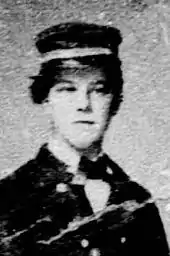 James Henry Carpenter in 1861 or 1862 in the Union Navy at about age 15.
James Henry Carpenter in 1861 or 1862 in the Union Navy at about age 15.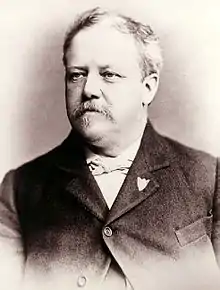 James Henry Carpenter, about 1895.
James Henry Carpenter, about 1895. Carpenter Steel Company Plant in 1893, Reading, Pa, looking east.
Carpenter Steel Company Plant in 1893, Reading, Pa, looking east. Carpenter plant, circa 2010, looking north.
Carpenter plant, circa 2010, looking north.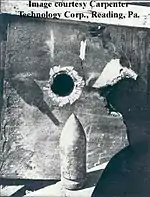 Carpenter projectile test on steel plate circa early 1890s.
Carpenter projectile test on steel plate circa early 1890s.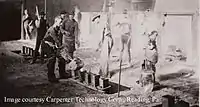 Carpenter in the 1890s pouring steel into crucibles.
Carpenter in the 1890s pouring steel into crucibles.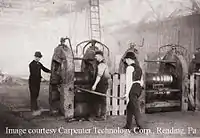 Carpenter rolling mill in the 1890s.
Carpenter rolling mill in the 1890s.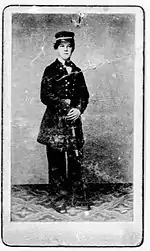 Full picture: James Henry Carpenter in 1861 or 1862 in the Union Navy at about age 15.
Full picture: James Henry Carpenter in 1861 or 1862 in the Union Navy at about age 15.
References
- "Carpenter Technology Corporation 2019 Form 10-K Annual Report". U.S. Securities and Exchange Commission.
- DEVLIN, RON (February 13, 2018). "History Book: Carpenter Steel gains global reputation". Reading Eagle.
- "FundingUniverse: Carpenter Technology Corporation History".
- "125 years at Carpenter". Reading Eagle. December 29, 2014.
- Cobb, Harold M. (2010). The History of Stainless Steel. ASM.
- "The Origin of Alloy 20". Rolled Alloys.
- "Carpenter". Connecticut Post. July 7, 1961.
- "In Accord With RCA". The New York Times. June 30, 1970.
- Mergent Industrial Manual. Mergent, Inc. 2001.
- "Carpenter Technology closing Orangeburg plant; 26 jobs lost". The Times and Democrat. September 1, 2012.
- "498 Steelworkers Walk Off Jobs". The New York Times. Associated Press. September 2, 1986.
- "Steelworkers Reach Accord to End Strike". The New York Times. Associated Press. December 15, 1986.
- Graves, John H. (August 1994). "Effect of Heat Treatment on the Microstructure and Properties of AerMet6 100 Steel" (PDF). United States Army Research Laboratory.
- "Corrosion resistant, martensitic steel alloy Patent US 5370750 A".
- "Carpenter Technology to Acquire Dynamet". The New York Times. Reuters. January 8, 1997.
- "CARPENTER TECHNOLOGY TO ACQUIRE TALLEY INDUSTRIES". The New York Times. Dow Jones & Company. September 27, 1997.
- "CARPENTER TECHNOLOGY SELLING TALLEY BUSINESSES". The New York Times. Bloomberg News. July 1, 1998.
- "CARPENTER TECHNOLOGY TO EXPAND PLANT CAPACITY". The New York Times. Bloomberg News. October 28, 1998.
- "Anne Stevens Appointed Chairman, President and Chief Executive Officer of Carpenter Technology". thomasnet.com. October 30, 2006. Retrieved October 9, 2019.
- "Carpenter CEO Anne Stevens speaks at spring commencement". psu.edu. May 6, 2008. Retrieved October 9, 2019.
- HEEBNER, JENNIFER (October 29, 2009). "Scott Kay, Spectore, and Carpenter Technology Unveil BioBlu 27". RELX Group.
- "PremoMet™ Alloy Seen as a Lower Cost Alternative to Cobalt-Containing Alloys" (Press release). Business Wire. December 3, 2009.
- "Beryllium-free Cobalt Alloy for High-load Bushings". ASM. March 2010.
- "Carpenter Technology Announces Acquisition of Amega West Services, LLC – Expands Reach in the Oil & Gas Market" (Press release). Business Wire. January 3, 2011.
- Miller, Karen L. (February 25, 2012). "Carpenter buys former Dana site". Reading Eagle.
- "Carpenter to Establish Manufacturing Facility in China" (Press release). Business Wire. August 30, 2012.
- "Carpenter Technology Names Tony R. Thene to Serve as President and CEO" (Press release). Business Wire. June 2, 2015.
- "Carpenter Technology Announces Plans for Emerging Technology Center" (Press release). Globe Newswire. July 16, 2018.
- "AGERE SYSTEMS, INC.; CYTEC INDUSTRIES, INC.; FORD MOTOR COMPANY; SPS TECHNOLOGIES, LLC; TI GROUP AUTOMOTIVE SYSTEMS, LLC v. Carpenter Technology Corporation, as Appellant" (PDF). United States Court of Appeals for the Third Circuit. April 12, 2010.
- D'Angelo, Marilyn S. (November 5, 2009). "Two companies responsible for bulk of river pollution". American City Business Journals.
External links
- Business data for Carpenter Technology Corporation: